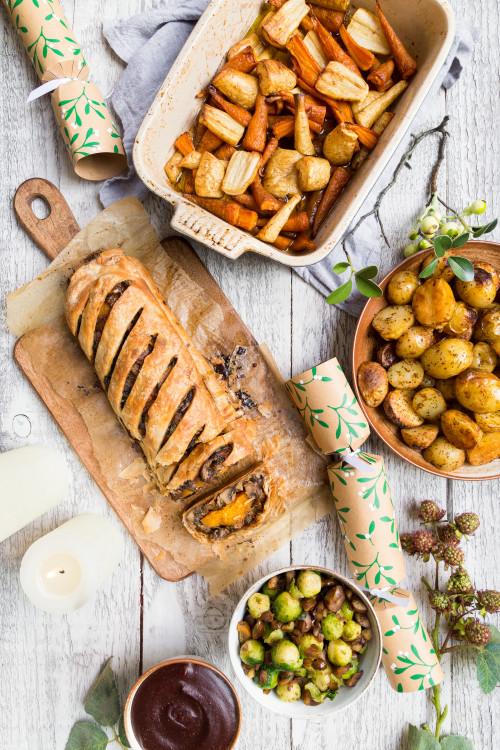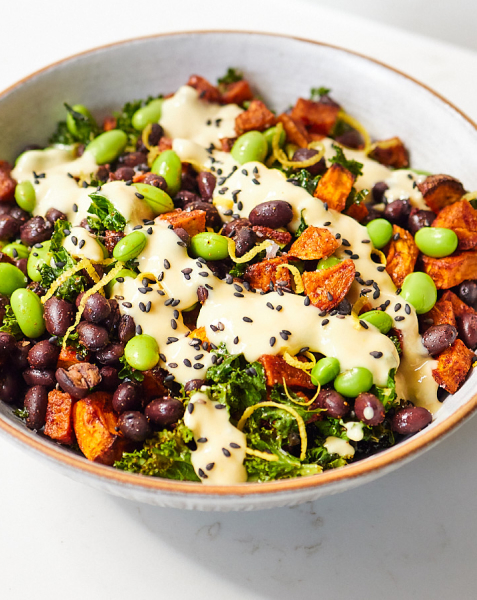It’s hard to over-emphasise how important protein is. Protein is found in every cell of the human body, even our DNA is made up of protein. Protein is involved in all processes in the body, from energy production, to supporting the transportation of substances (vitamins, minerals, oxygen), speeding up chemical reactions, building hormones and neurotransmitters (which affect our mood and emotions) and allowing our hormones and immune system to work effectively. It’s also essential for building and repairing cells and tissue, including the skin, hair, muscle and bone.
Can I get enough protein on a vegan diet?
One of the biggest concerns when moving towards a plant-based diet is protein. The good news is that it’s not something to worry about and not being able to get enough protein on a plant-based diet is a myth. Numerous studies show vegans consistently meet, if not surpass, the recommended daily allowance of protein, consuming 60–82g a day on average.
How much protein do you need?
The NHS recommends 50g of protein per day and the most widely used reference point is 0.75 or 0.8 multiplied by each kilogram of body weight, so for someone who weighs 60kg that’s 45–48g of protein each day. If you are an athlete or you have any medical issues, your requirements for protein may go up.
For a healthy person on a varied diet, filling a quarter of your plate with protein-rich plant foods will easily cover your protein requirements. If you’re aware of what foods to go for, it is not difficult to meet your daily protein needs.
What’s the difference between plant and animal protein?
Protein is made up of 20 different amino acids, or ‘building blocks’, which can be reconfigured to create thousands of different cells and molecules to form our tissues and organs, while also supporting a vast array of physiological reactions that allow us to repair and heal, create energy, fuel our immune system synthesise our hormones and neurotransmitters (which control our mood, emotions, concentration and beyond). Our bodies can’t make nine of these amino acids themselves, so we need to make sure we get enough daily through the diet to supply all of these critical functions and allow the body to regenerate.
Animal proteins are labelled ‘complete proteins’ as they contain all nine of the essential amino acids. Plant proteins contain these essential amino acids, but most of the time, one or more of them exists in sub-optimal quantities. Therefore, combining different protein sources together and ensuring you have a balanced, varied diet is important as when two sources are eaten together, the protein usually becomes complete. This isn’t something to worry about each meal, but across the day.
How do you make a complete protein?
If you’re eating a mix of beans, whole grains, nuts, seeds and soy products in your diet you’ll have no problem getting all the amino acids you need and you’ll likely be combining them already without even thinking about it, e.g. peanut butter on wholegrain toast, lentil Bolognese with brown rice or a whole wheat wrap with hummus and veggies.
Here are some examples:
Nuts or seeds with whole grains, e.g., almond/peanut butter on wholegrain toast
Nuts or seeds with beans, e.g., toasted sunflower seeds with a chickpea salad
Beans and whole grains, e.g., beans and brown rice or hummus and rye crackers
Great plant-based sources of protein are: tofu, tempeh, edamame, peas, quinoa, all nuts/seeds/nut butters/tahini (including chia seeds, hemp seeds etc.), beans and legumes.















